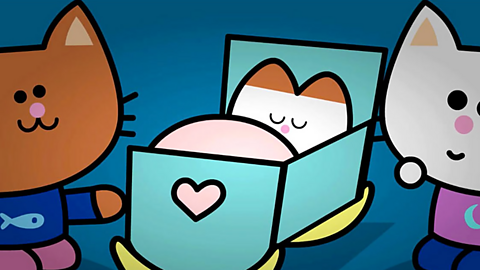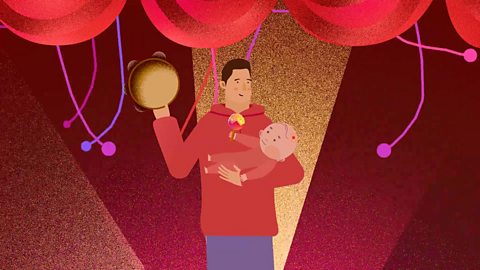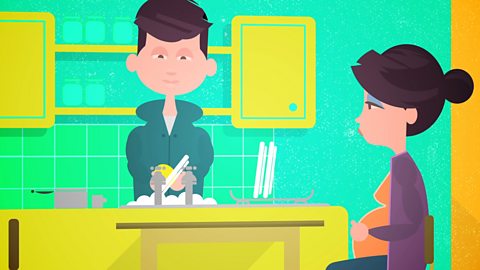The need to sing lullabies to our children is almost instinctive – we have proof that – but they're almost certainly older than that.
As a parent, you probably have a favourite. An old faithful that has your baby drifting off in no time – Twinkle, Twinkle, perhaps, or Rock-a-Bye Baby.
But why do certain songs work so well? Are there other hidden benefits to singing lullabies? We spoke to baby sleep consultant Andrea Grace to find out…
What is a lullaby?
A lullaby is a song or piece of music that is played to soothe and send the audience to sleep. Most are sung, but they can also be played on an instrument. We’ll be focussing on lullabies with words.
Lullabies are often confused with nursery songs and rhymes, as both are primarily sung for babies, toddlers and young children. The difference is in the intention: lullabies are specifically sung to soothe and encourage sleep.
Many of our most famous lullabies (and not just those from Western culture) have been passed down in the folk tradition, the original composer, and sometimes the meaning of the words, lost to time. Think about the words of Rock-a-Bye Baby: what do they mean?
Why do lullabies send babies to sleep?
Lullabies are a great soothing tool for parents to use with babies. Some have argued that this is due to the soft rocking rhythm found in many lullabies, or the repetition of certain words or phrases. Andrea agrees…
"I think it's something to do with the tempo of the lullaby, as well as the closeness. You don't get a lullaby that's exciting, fast-paced - they're always very slow tempo."
She also suggests an interesting theory around the perfect lullaby…
"They shouldn't be faster than the mother's resting heartbeat, which is what the baby is used to hearing."
"The most important thing about a lullaby is that it becomes a positive sleep association. So if you sing the same song or play the same tune as part of a bedtime routine, that's so incredibly powerful, because even if a baby isn't that tired, if the lullaby is familiar to them, it almost conditions them to fall asleep. It's such a strong association."
And, at the end of the day, babies just love hearing a soft voice that lets them know that they’re safe.
What are the benefits of lullabies for babies?
Singing is something that babies tune into naturally, so it’s a great way to get their attention and help them learn new words. Listening to your singing also encourages bonding through the release of oxytocin, ‘the love hormone’, in your baby’s brain, which is proven to relieve stress. They can also be a stress-reliever for you too, says Andrea. "If you're singing a lullaby that involves what they've done that day, it's a bit mindful, really. Sing about the things they like, you know, 'you like apples, you saw a dog' and all the people that love them, 'Granny loves you and Aunty loves you.'"
So sing loud and proud - they won’t care if you’re a little flat!
Four of the best 91»»±¨ lullabies and nursery songs
Twinkle Twinkle Little Star
A classic lullaby. The tune is also used in the alphabet song (go on, sing that one in your head, we promise!).
Twinkle Twinkle Little Star lyrics
Twinkle, twinkle, little star
How I wonder what you are
Up above the world so high
Like a diamond in the sky
Twinkle, twinkle, little star
How I wonder what you are
Golden Slumbers
Check out this cute animated film from 91»»±¨ Teach for Golden Slumbers. This lullaby has its roots in the 1600s, when it was written as 'The Cradle Song'. The Beatles famously released an adaptation on Abbey Road in 1969.
You can find loads more lullabies and nursery rhymes films in 91»»±¨ Teach's collection here.
Golden Slumbers lyrics
Golden slumbers kiss your eyes
Smiles awake you when you rise
Sleep pretty baby don't you cry
And I will sing you a lullaby
Rock you, rock you, lullaby
Time for bed and time to sleep
Dream little one in slumbers deep
Sleep pretty baby don't you cry
And I will sing you a lullaby
Rock you, rock you, lullaby
Eye Mélo Tolongo Wáyé? (How Many Birds Followed Robin to the World?)
This sweet ≥€¥«∞˘√π≤˙√° lullaby is perfect for bedtime! ≥€¥«∞˘√π≤˙√° is a language that originates and is spoken primarily in West Africa, but there are many speakers in the UK.
Eye M√©lo Tolongo W√°y√©? lyrics in ≥€¥«∞˘√π≤˙√° and English
≥€¥«∞˘√π≤˙√°
Eye mélo tolongo wáyé? Tolongo!
Eye mélo tolongo wáyé? Tolongo!
Ọ̀kan dúdú aro, Tolongo!
Ọ̀kan rẹ̀rẹ̀ osùn, Tolongo!
So-so-so f’ìrù ba’lẹ̀, So o o!
So-so-so f’ìrù ba’lẹ̀, So o o!!!
English
How many birds followed robin to the world? Followed robin!
How many birds followed robin to the world? Followed robin!
One was blue like indigo. Followed robin!
The other was crimson like camwood. Followed robin!
Dashing-dashing-dashing, tails to the ground. Dashing!
Dashing-dashing-dashing, tails to the ground. Dashing!
Snuggle Up and Choose a Book
Making up your own songs, nursery rhymes and lullabies can be a lot of fun and will help you to introduce new words to your child.
This made-up song takes the tune of Twinkle Twinkle Little Star and adds soothing lyrics around reading and books - perfect for settling your baby down before storytime and bedtime.
Snuggle Up and Choose a Book lyrics
Snuggle up and choose a book
Words and pictures, take a look
Reading can be really fun
It is bedtime when we're done
Snuggle up and choose a book
Words and pictures, take a look
Lullaby FAQs
Should I play lullabies all night?
According to Andrea, consistency is key.
"If a baby likes to listen to white noise or a lullaby on a sound device as they go to sleep, it does need to be on all night. Some devices cut off after a certain amount of time and that's not a good thing, it's better to have it on quietly all night to provide this continuous feeling of calmness."
"Sleep happens in cycles and babies wake up during the night. If they are falling asleep to a song, when they naturally wake up later on and they don't hear that song anymore it can be a little unsettling."
"If you've got noisy neighbours too, having a lullaby on in the background might help to muffle some of the loud sounds."
And if you are leaving music on all night, keep it under 50 decibels, Andrea suggests.
Do babies hear lullabies in the womb?
Yep! Babies can hear voices from inside the womb - part of the reason we know this is because they move around less and have a slower heartbeat when they hear their mum speak. They're picking up the building blocks of language before they're even born!
So, by singing lullabies and nursery rhymes to your bump, you're helping your baby get used to your voice, your language and their future favourite songs.
When should I start singing lullabies to my baby?
You can sing lullabies to your baby before they're even born! Singing and speaking to your bump has proven benefits around bonding and language learning.
Once your baby is born, they'll continue to pick up on your language, especially when you sing to them, and lullabies will (hopefully) give you a helping hand in getting them to sleep.
Can I make up my own lullaby for my baby?
Of course! This is a fun way to help increase the number of words your baby is exposed to, which will aid their language development.
To get started, you could take the tune of a lullaby you know and come up with new lyrics - make it about your baby's favourite teddy or add their name.
Take a look at Snuggle Up and Choose a Book above for an example of a made-up lullaby.
How should I sing lullabies to your baby?
"The first thing to say is that baby loves the sound of your voice and will be familiar with it from before birth - so you do not have to be a good singer!" Andrea explains.
She also suggests that it's best to tail off the lullaby before your baby actually falls asleep.
"You might rock your baby in your arms and sing, then put them down in their cot and sing a little more, but then as they're starting to show signs of going to sleep, you could replace it with gentle shhing and quietness."
"So, when they wake up later they won't think, 'Ah! Where's Mummy and Daddy?'"
"If you're stuck for what to sing, sing a familiar song, like Old MacDonald, but at a much slower tempo and let that be their lullaby."
"If you've got two parents singing, and you both have different voices, if you choose the same song, then either one of you can use it to put the baby to bed and it will be a positive sleep association."






